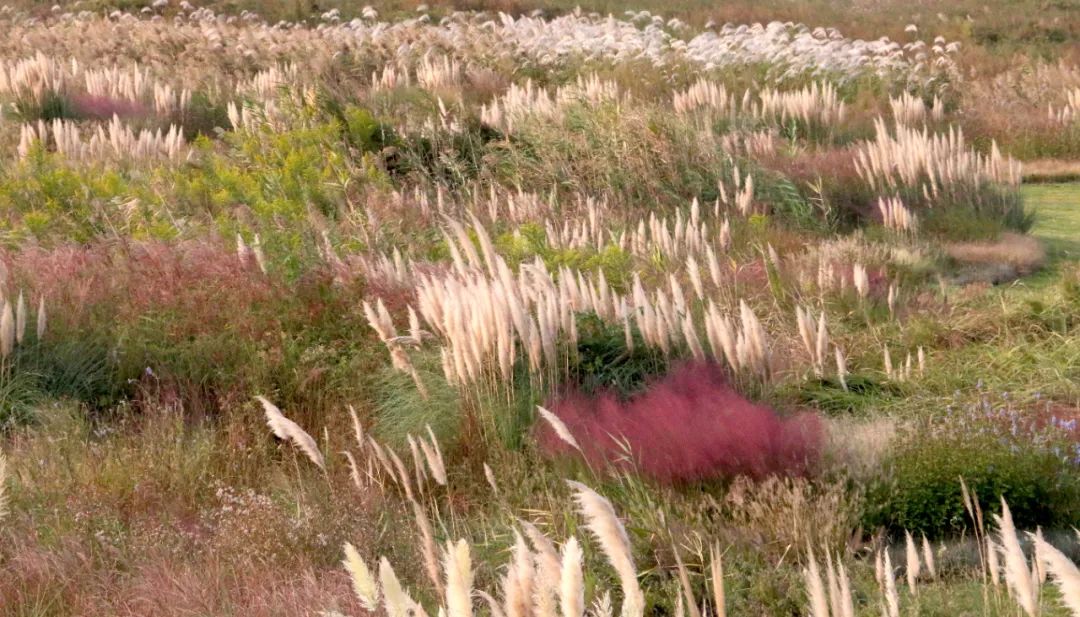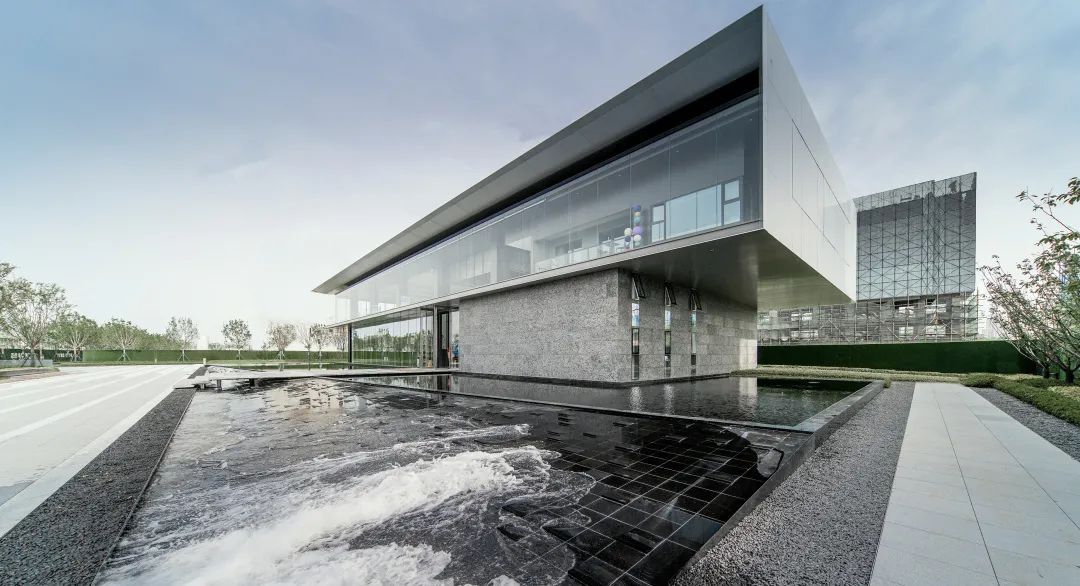野草
野草,是一种身份特殊的植物,大部分的野草不被关注,野草有时被等同于荒芜。在农民的眼里,野草是庄稼地里要被铲除的对象,但野草是生态环境的重要基底。“离离原上草,一岁一枯荣,野火烧不尽,春风吹又生。”生命力极其旺盛的野草,在岁月荣枯中,通过不同的色相变化提醒大家:生命是一个循环,每个阶段都是自然而然的状态,都有着独特的美。
Wild grass, a plant with a special identity, go unnoticed for the most part, and weeds are sometimes equated with barrenness. In the eyes of farmers, weeds are objects to be eradicated from crop fields, but they are an important substrate for the ecosystem. "The grass on the plains is left to dry up once a year; it is not burned by wildfire, but grows again in the spring breeze." Extremely vigorous weeds, in the years of glory and wither, through different color changes to remind everyone: life is a cycle, each stage is a natural state, all have a unique beauty.
△秋色渲染的绚丽画布 ©高灼见、崔峻



△晨光中的自然生境 ©高灼见、崔峻
山东日照是一个沿海城市,城市西南一隅跟江苏交界,正位于地理南北的分野,是北方的南方,南方的北方。项目位于日照岚山区,历史上为大片滨海滩涂,后演化为城市绿地。由于位处城市边缘,绿地接近原生野化状态,成为一片撂荒之地。
Rizhao is a coastal city in Shandong Province. The southwest part of the city borders Jiangsu Province and is located in the geographical north-south divide, which is the south of the north and the north of the south. The project is located in the Lanshan District of Rizhao, which was historically a large coastal mudflat and later evolved into an urban green space. Due to its location at the edge of the city, the green space is close to the original wild state, becoming a piece of abandoned land.

△撂荒的场地原貌 ©高灼见、崔峻



其一南北狭长地块,将升级改造为开放式城市公园。场地北部栽植了大片格桑花,南部没过人高的荒草严密,已然成为人不可进的野草王国。这片场地内,大量芦苇、芦荻、芒草、野豆荚、蒿草等乡土野草混合着入侵物种一枝黄花,肆意生长,生机勃勃,荒蛮而原始,杂芜中也让人不敢接近。
A long, narrow north-south plot of land will be upgraded and transformed into an open urban park. The northern part of the site is planted with a large number of gerberas, while the southern part has become an inaccessible weed kingdom with dense grasses that are no taller than a mans height. Inside this site, a large number of reeds, reed, mango grass, wild pods, artemisia, and other native weeds mixed with the invasive species of a branch of yellow flowers, growing unchecked, vibrant, barbaric and primitive, barren, but also let people dare not approach.
我惊叹于这片荒野之境的力量,亦惊叹于野草的生命力和杂乱中的秩序,每类荒草都按自然秩序占据自己的地盘,相邻而不侵扰。自然选择的结果在这片土地呈现出天然的结构,在北方凛冽的秋风中,展现出 “蒹葭苍苍,白露为霜”和“长亭外,古道边,芳草碧连天” 芳草萋萋的荒野感。如果做一个野草公园,在保留乡土野草的同时增加驯化野草组合的生境,让粗犷的乡土野草和细腻的驯化野草形成对比,让人们认识到乡土野草的魅力,岂不是一件有意义的事情?
I marveled at the power of this wilderness area, but also marveled at the vitality of the weeds and order in the mess, each type of weeds in accordance with the natural order to occupy their own turf, neighboring and not intrusive. The result of natural selection in this land presents a natural structure, in the bitter autumn wind in the north, showing "reed reed, white dew for frost" and "long pavilion, the side of the ancient road, grass Bilian Tian" grassy sense of wilderness. Wouldnt it be a meaningful thing to make a wild grass park, preserving the native wild grasses while increasing the habitats of domesticated wild grass combinations, so that the rough native wild grasses and the delicate domesticated wild grasses can be contrasted, and people can recognize the charm of the native wild grasses? 
△宛如自然的野草生境 ©高灼见、崔峻


△蒲苇和小兔子狼尾草 ©高灼见、崔峻
我决定,保留芦苇、芦荻、芒草和野豆荚这类野草,去掉容易引起人们过敏的蒿草和入侵植物一枝黄花,让自然显现,做个野草的公园。I decided to keep the weeds like reeds, rushes, manzanita and wild pea pods, remove the artemisia and the invasive plant Ichabod, which tends to cause allergies, and let nature reveal itself by making a park of grass.
Reinventing the Urban Prairie in the Wilderness
在这片自然的肌理上开辟一条可进入的路径成为难点。将近两百亩的场地完全被野草和草花遮蔽,去掉部分杂草而又保留部分野草的同时,需综合考虑参观的动线和视线规划路径。在没有原始图纸,且工期紧张的情况下,只能完全依赖现场的感觉,通过就地经验设计。我决定用铲车来解决这个问题。施工方的负责人是一个水平很高的铲车手,他亲自开着铲车,我站在铲车驾驶舱的一侧,一只手抓着扶手,半个身子探出车外,引导他在这片茫茫草野中开路。一天功夫就确定完主要道路。
Creating an accessible path through this natural texture became a difficult task. Nearly two hundred acres of the site were completely covered with weeds and grasses, and while removing some of the weeds and retaining some of the grasses, it was necessary to plan a path that took into account the movement and sight lines of the visitors. With no original drawings and a tight schedule, we had to rely entirely on our sense of the site and design through in-situ experience. I decided to solve the problem with a forklift. The person in charge of the construction party was a highly skilled forklift operator, and he drove the forklift himself, while I stood on the side of the forklifts cockpit, gripping the handrail with one hand and poking half of my body out of the vehicle, guiding him to make a path through this vast grassy field. In one days work, the main roads were identified.

△施工过程中的野草 ©高灼见、崔峻


△保留的本土荒野植物 ©高灼见、崔峻

△把铲车作为画笔,荒野中开路 ©高灼见、崔峻
有了拿铲车当画笔的经验,接下来的程序有条不紊:开荒去杂,地形塑造,现场放线,手植现种,随形赋势,步步为营。
With the experience of using the forklift as a paintbrush, the next procedure is organized: open up the land to remove weeds, terrain shaping, on-site placement of the line, hand-planting now planting, with the shape of the situation, step by step.
我和另外一个铲车师傅,在去掉杂草的场地中,现场依次序确定好一系列高点,继续用铲车调整和调配标高,塑造连绵顺滑的微地形。
I and another forklift master, in the field to remove weeds, the scene in order to determine a series of high points, continue to use the forklift to adjust and adjust the elevation, shaping the continuous smooth micro-topography.


△不同高度的野草组合 ©高灼见、崔峻
地形塑造完毕,野草的搭配和种植形式是为关键。栽草经验的赵老师协助探讨,选择了适合日照气候生长的几十种野草,按株高排序,从最高的细叶芒和蒲苇开始,到最矮的蓝茅,组成梯度式野草集。同时采用结缕草草坪与观赏野草生境结合的方式,重新组织图底关系。草坪部分作底,方便行走,野草生境为图,成为视觉焦点。第一步确定图底边界,第二步确定品种边界。我和施工师傅一起,用白灰现场放线,就近又跑远,通过不同视角的来回反复测试,完成各类边界划分。
After the terrain was shaped, the matching and planting of weeds was the key. Mr. Zhao, who has experience in planting grasses, assisted in the discussion, and selected dozens of weeds suitable for sunshine climate growth, sorted by plant height, starting from the tallest fine-leafed awns and cattails, to the shortest blue fescue, to form a gradient type of wild grass set. A combination of knotweed lawn and ornamental weed habitat was also used to reorganize the relationships on the bottom of the map. The lawn portion of the map is used as the base for ease of walking, and the weed habitat is the map and becomes the visual focal point. The first step was to determine the boundaries of the base of the map, and the second step was to determine the boundaries of the species. I and the construction master together, with the white ash on-site line, near and far, through different perspectives of the back and forth repeated tests, to complete the various types of boundary delineation.


整个设计施工一体化的过程,我把自己当作园丁,亲自参与栽植过程。和几十位工人同时工作也是挑战,既要保证效果,又要保证效率,东西南北都要兼顾,犹如一场混战。正值十一月份北方的深秋,从早上栽到日落西山,最后下来双手也冻僵,但每天在虫鸣中结束工作,也是一种劳作的诗意情境。
Throughout the whole process of design and construction integration, I treated myself as a gardener and personally participated in the planting process. Working with dozens of workers at the same time is also a challenge, not only to ensure the effect, but also to ensure the efficiency, both east and west, north and south have to be taken into account, as if a melee. It was late fall in November in the north, and my hands were freezing from morning to sunset, but it was a poetic mood of labor to end each days work amidst the chirping of insects.



△诗情画意的秋景 ©高灼见、崔峻
荒野之美和人工之美
The beauty of wilderness and the beauty of artificiality
经历一年的生长,野草公园长成了想象中的样子。保留下来的乡土野草,状态依旧生猛热烈,为整幅自然画作铺设了绵密的背景;而新营造的野草生境,观赏性强,品种多,精心的组合搭配,视觉上更加细腻,成为画作点睛的前景。
After a year of growth, Weed Park has grown into what it was imagined to be. The preserved native weeds, still in a lively and enthusiastic state, lay a dense background for the whole natural painting; while the newly created weed habitats, with strong ornamental properties and many varieties, are carefully combined and matched to be visually more delicate, and become the foreground for the paintings accent.

△草甸状的野草生境 ©高灼见、崔峻

△驯化野草和本土野草的组合 ©高灼见、崔峻
两类野草的边界自然融于一起,但是各自生长,并无越界。乡土野草和驯化野草相互映衬,前景清晰,边界模糊,浪漫而松弛,形成自然的焦距和景深。野草公园的探索把两种属性的野草结合到了一起,保留下来观赏性强的乡土野草,同时运用了大量的驯化野草,将荒蛮的野和细腻的野结合到一起,犹如齐白石先生的绘画,大写意的树与工笔画的虫结合,相映成趣,毫不违和。
The borders of the two types of weeds naturally blend together, but each grows separately and does not cross the line. Native and domesticated weeds mirror each other with a clear foreground and blurred borders that are romantic and loose, creating a natural focus and depth of field. The exploration of Wild Grass Park combines the two attributes of wild grasses together, preserving the ornamental native wild grasses, while using a large number of domesticated wild grasses, combining the barbaric wild with the delicate wild, just like Mr. Qi Baishis paintings, combining the trees of the large capitals with the insects of the Gongbi paintings, which reflect each other in a way that is not in contradiction with each other.
△浪漫的秋景 ©高灼见、崔峻
中国地大物博,横跨不同的气候带,不同地理分区都有自己独特的野草生境。如果在城市公园中保留乡土野草,遵循自然选择的结果,形成本土野草独有的景观,不仅尊重地域文化,也利于地方生态的保护。从美学的角度,大基底的本土野草作背景,利用驯化过的野草营造野草花园,将花园藏入荒野,产生一种细腻与野性结合的浪漫荒野主义美学。
China is a vast country spanning different climatic zones, and different geographical divisions have their own unique weed habitats. If native weeds are preserved in urban parks, following the results of natural selection and forming a landscape unique to native weeds, it will not only respect the regional culture, but also contribute to the protection of local ecology. From an aesthetic point of view, the large base of native weeds as a background, the use of domesticated weeds to create a weed garden, hiding the garden into the wilderness, resulting in a romantic wilderness aesthetic that combines subtlety and wildness.
项目名称:多岛海野草公园
项目地点:山东省日照市岚山区
委托方:岚山海洋发展公司
设计公司:孔祥伟工作室
设计师:孔祥伟、孔雀
设计施工时间:2022年10月—11月
文字:孔祥伟
Project Name: Duodao sea wilderness parkLocation: Lanshan district, Rizhao, ShandongClients: Lanshan marine development companyDesign Company: Kong Xiangwei StudioLead architect: Kong Xiangwei,Kong QuePhotography: Gao Zhuojian,Cui JunKong,Xiangwei 
































































